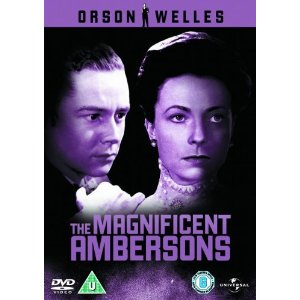
There aren’t any times but new times… Eugene Morgan, The Magnificence of the Ambersons
Orson Welles’ mellifluous tones introduce his second feature, telling us about the magnificence of the Ambersons, and acquainting us with the arrogant George Minafer Amberson played by Tim Holt. It is the sincere hope of many in the small town of Indianapolis that George will one day get his comeuppance and both the decline of the family’s grandeur and George’s position vis-a-vis any comeuppance are tracked throughout the film. At the start the horse-drawn buses will stop at a wave from a society lady in her mansion. Other passengers will get off and have a smoke as they wait for her to arrive and take a seat. By the end such deferential behaviour is gone and the symbolic automobile has arrived.

Welles’ Mercury theatre troupe star in the film, including the incomparable Joseph Cotten and Agnes Moorhead who both also appeared in Citizen Kane. The Magnificent Ambersons followed two years after that masterpiece and Welles again directs, although he doesn’t appear in front of the camera for reasons that are not clear. He also did not write the original story, it being based on the 1917 Pulitzer Prize winning novel by Booth Tarkington. Ambersons focuses on one wealthy family’s decline as a way of examining change in US society in late 19th century when life was changing rapidly and the horseless carriage was shrinking distances and changing perceptions of what was possible.
Welles was shooting at a time when film noir was a popular Hollywood style and the way The Magnificent Ambersons is shot could place it in that genre, if it wasn’t for the lack of a central crime and a hero who likes trench coats. Silhouetted figures speak out of the gloom, and all the strange angled shots and dark shadows are present. Many of the filmic tropes of Kane can be seen in this later film. The mis-en-scene is fantastic, with many of the shots composed in complicated manners that are still rarely seen today. The camera picks out much in long shot, conversations overlap, non-speaking characters remain in shot whilst others interact as though they were not there. It is mannered and precisely choreographed with great framing and use of townfolk’s opinions to drive the story forward. There are amusing digressions into fashions and a camera that carefully moves between different speakers at different sides of the set with aplomb. Welles was definitely a cinematic genius.
Joseph Cotten is the stand out performance as Eugene Morgan, a young buck who courts Isabel in her youth. After one glass too many he trips over his double bass when out serenading under her window. Today the very idea that he was out serenading her with a double bass would surely have been enough to cover any other misdemeanours, but – appalled at his behaviour – Isabel immediately cuts off contact with him and marries someone else. The rest of the film spends time examining what happens when two people miss out on fulfilling the love that they felt for each other. It also looks at the part that fear of society has on relationships. In that sense it is a story of its time, pre two mechanised world wars when what will people think drove behaviour. But, even if it is to a lesser extent, what will people think still drives behaviour today, so the film retains an unexpected relevance. It is not just entertainment but a comment on how we can lose our lives if we give in to the unreasonable requests of others, even if they be our much-loved, spoilt children.
Ambersons is never seen in the original cut intended by the director. It now runs to around 90 minutes long – Welles’ original version was over two hours long. RKO, having invested $850,000 and not liking the response of a test audience cut out huge swathes of the film. Not content with that they also reshot the ending, which Welles had changed from that of the source material. This is a great period piece from the golden age of Welles’ career. It comes highly recommended. I for one would place it on a footing with Citizen Kane. It has less of a broad sweep, but is more humane and has more to say about family lives that we can relate to today. I have been inspired to read the original book. If you have been too please tell us in comments below.
How do you think The Magnificent Ambersons compares with Citizen Kane?
1942
88 mins
USA
Directed by Orson Welles

Leave a Reply